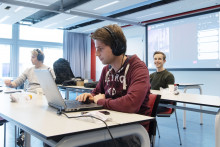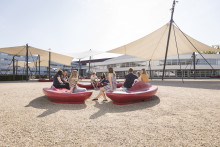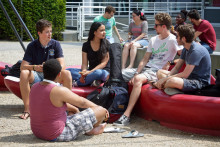The document 'Hybrid Way of Working-LTSH' sets out the basic principles for the post-covid campus. It outlines the way in which staff and students will be able to work and study partly physically and partly online after the pandemic. Both the Executive Board and the University Council seem broadly positive about this hybrid future, but doubts can also be heard from both sides.
On behalf of UReka, council member Kevin Witlox - symbolically during the first hybrid University Council meeting - lists concerns. According to him, the discussion should be held in an open manner. 'It does not help that the document is only available just before the council meeting, because that is not conducive to an open discussion.'
Also, according to him, a hybrid future does not only create opportunities. It also brings challenges. And Witlox is sceptical about that. 'Hybrid working requires a change of culture. Since employees work across teams, faculties and departments, we have our doubts about the practical feasibility.'
As long as there is no feasible plan, the university cannot assume that the physical capacity on the campus will decrease, according to the University Council. Moreover, according to Witlox, the document focuses too much on management and employees, rather than on students.
On behalf of the Executive Board, Mirjam Bult acknowledges the importance of an open discussion. 'The UT community is the most important factor in the choices we make about a new way of working and studying. We would like to receive as many comments as possible and we want to involve everyone in this.'
Bult's impression is that students and staff think differently about a hybrid future. 'It seems that especially students are open to a more flexible future. It is going to be quite a challenge to make choices, because we are not going to please everyone in any case.'
How do you facilitate a cultural change in which practical problems occur as little as possible? According to the University Council, this question in particular must be answered, but only after an open discussion in which as many people as possible are heard. An opinion that Bult shares. According to her, a wellbeing survey could offer a solution, because it is a good instrument to find out how employees experience and value different forms of hybrid working.








